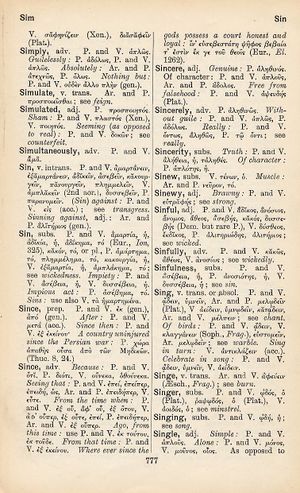simulate: Difference between revisions
From LSJ
(D_8) |
(3_12) |
||
| Line 6: | Line 6: | ||
{{Gaffiot | {{Gaffiot | ||
|gf=<b>sĭmŭlātē</b>¹⁴ ([[simulo]]), d’une manière simulée, par feinte : Cic. Nat. 2, 168 ; Q. 1, 1, 13 || simulatius Anth. 476, 4. | |gf=<b>sĭmŭlātē</b>¹⁴ ([[simulo]]), d’une manière simulée, par feinte : Cic. Nat. 2, 168 ; Q. 1, 1, 13 || simulatius Anth. 476, 4. | ||
}} | |||
{{Georges | |||
|georg=simulātē, Adv. ([[simulatus]] v. [[simulo]]), zum Scheine, [[mit]] [[Verstellung]], Cic. Rabir. [[Post]]. 33; de off. 3, 68: Ggstz. [[vere]], Cic. in Pis. 27: Ggstz. ex [[animo]], Cic. de nat. deor. 2, 168: verb. [[ficte]] et [[simulate]], Cic. ad Q. fr. 1, 1, 4. § 13. – Compar., simulatius exit proditionis [[opus]], Petron. poët. fr. 28, 4. | |||
}} | }} | ||
Revision as of 09:08, 15 August 2017
English > Greek (Woodhouse)
v. trans.
Ar. and P. προσποιεῖσθαι; see feign.
Latin > French (Gaffiot 2016)
sĭmŭlātē¹⁴ (simulo), d’une manière simulée, par feinte : Cic. Nat. 2, 168 ; Q. 1, 1, 13 || simulatius Anth. 476, 4.
Latin > German (Georges)
simulātē, Adv. (simulatus v. simulo), zum Scheine, mit Verstellung, Cic. Rabir. Post. 33; de off. 3, 68: Ggstz. vere, Cic. in Pis. 27: Ggstz. ex animo, Cic. de nat. deor. 2, 168: verb. ficte et simulate, Cic. ad Q. fr. 1, 1, 4. § 13. – Compar., simulatius exit proditionis opus, Petron. poët. fr. 28, 4.

